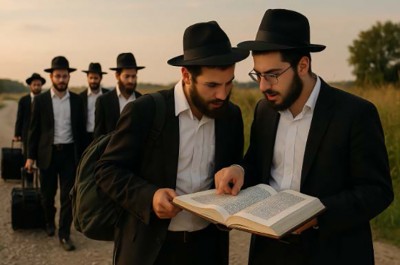
I want you to picture the last day of Moshe Rabbeinu’s life.
It was the seventh of Adar, the day Hashem commanded him to finish writing the Torah and to teach one final lesson — one that would echo through the ages.
That lesson was not just a warning. It was a promise:
“This song shall bear witness… it will not be forgotten from the mouths of their children.”
That promise — that the Torah will never be forgotten — has held true, no matter the odds. I’ve seen it with my own eyes. Even in the darkest times, Torah found a way to survive.
Hashem told Moshe to gather the entire nation every seven years during Sukkot, following Shemittah. Men, women, and children all stood together as the king read sections of Sefer Devarim. From “Shema Yisrael” to blessings and warnings, to the laws of kingship — the reading was meant to remind the nation of their covenant. Everyone was obligated to hear it — even the children, “so they will learn to fear Hashem.”
And then came the second command: “Write down this song.”
The Oral Torah teaches: this refers to the entire Torah. Every Jew is obligated to write a Sefer Torah — or ensure it is written on their behalf. Even if you inherited one, the mitzvah remains.
And Hashem reassures us:
“It will not be forgotten from the mouths of their descendants.”
Let me tell you how that promise played out in our times.
Before the Babylonian exile, Nebuchadnezzar exiled the great Torah scholars early. When the rest of the nation arrived, they found yeshivos already built in Bavel.
Before the destruction of the Second Beit HaMikdash, Rabbi Yochanan ben Zakkai secured permission from the Romans to establish Yavneh — which became the new spiritual center of klal Yisrael.
And in my own lifetime, I saw miracles unfold during the Holocaust. Lithuania became a temporary escape route. The Russians, who had jailed religious Jews and outlawed yeshivos, suddenly issued visas to yeshivah students. Rav Yechezkel Levenstein of the Mir Yeshiva said it best: “Even they didn’t know why they were letting us go.”
Trains carried us across the Soviet Union on the Trans-Siberian Railway. Rav Velvel Soloveitchik later said, “That railway was built to save the Torah.”
We arrived in Kobe, Japan. Twenty-five Jewish families welcomed us. The yeshivah reopened. Then we moved to Shanghai — and found a fully built synagogue with exactly the number of beds, chairs, and dishes we needed. Built by a secular Jew years earlier, it had stood empty — waiting for us.
In Shanghai, the Germans tried again. Gas chambers were installed. Countdowns began. Deportation threats loomed. But each time, something derailed the plan — Allied bombs, delayed orders, hidden messages. Hashem disrupted the enemy at every turn.
Not a single talmid of the yeshivah was harmed.
Years later, that same Mir Yeshiva would settle in Jerusalem. Today, it flourishes — with thousands learning in its walls.
This is the meaning of Hashem’s promise: “My words… will not depart from your mouth, your children’s mouths, or your children’s children… forever.” (Yeshayahu 59:21)
You want proof that the Torah will never be forgotten? You’re looking at it.
By Rabbi Yitzchok Zilber, zt”l, Founder, LaMaalot Foundation
Rabbi Yitzchok Zilber, zt”l, founded the LaMaalot Foundation and dedicated his life to teaching Torah. His writings continue to inspire Jews worldwide. © 2023 The LaMaalot Foundation. “Conversations on the Torah,” by Rabbi Yitzchak Zilber is catalogued at the Library of Congress. All rights reserved. www.LaMaalot.org.
Parashat Vayeilech: A Promise That Will Never Be Forgotten
Typography
- Smaller Small Medium Big Bigger
- Default Helvetica Segoe Georgia Times
- Reading Mode







